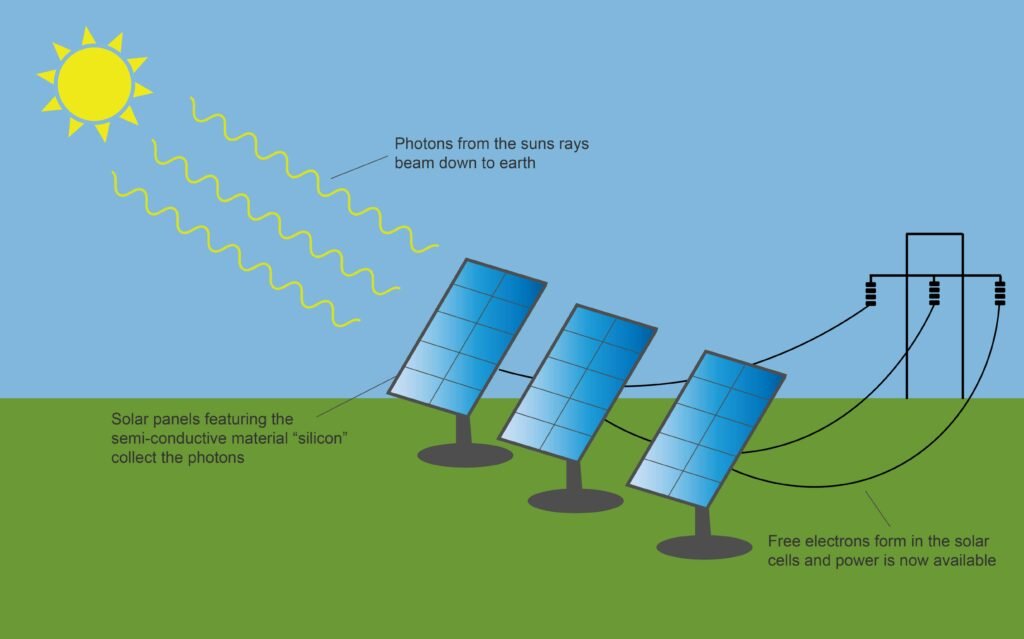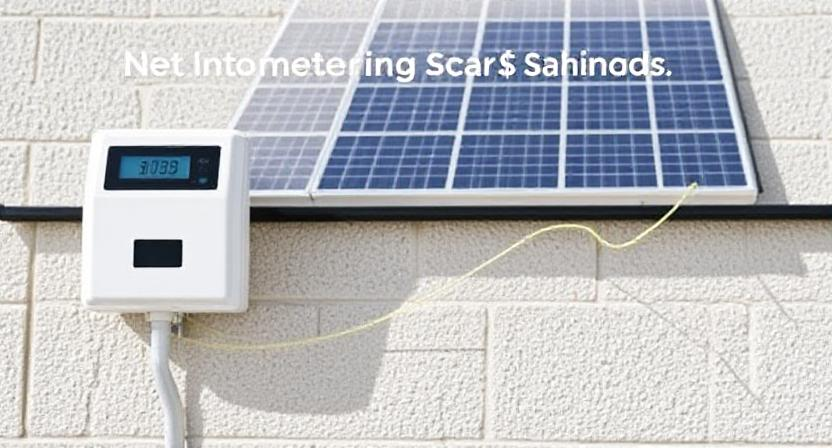With the rising costs of traditional energy sources, you may be seeking ways to reduce your monthly expenses. Have you ever considered how solar energy could provide a solution to your escalating energy bills? By harnessing the power of the sun, you can take control of your electricity production and potentially save a substantial amount over time. But how exactly does this process work, and what are the key factors to consider when making the switch to solar energy?
Key Takeaways
- Solar energy reduces reliance on the grid, lowering monthly utility bills.
- Excess energy can be stored or sold back, maximizing savings.
- Government incentives like tax credits and rebates offset installation costs.
- Long-term savings from solar panels offset initial investment.
- Solar panels increase home value, attracting buyers seeking energy-efficient homes.
Visit our website and “Learn How Solar Saves You Money”
Benefits of Solar Energy

When considering the benefits of solar energy, one can’t overlook its significant impact on reducing monthly energy costs.
By harnessing the power of the sun, you can generate your electricity, leading to substantial savings on your utility bills.
Solar panels are a one-time investment that can provide long-term financial benefits. Additionally, many governments offer incentives and rebates for installing solar panels, further lowering the initial costs.
Beyond cost savings, solar energy is environmentally friendly and sustainable. Unlike traditional energy sources that rely on fossil fuels, solar power produces clean electricity without harmful emissions.
Reduced Electricity Costs
Consider how solar energy can directly impact your monthly expenses through significantly reduced electricity costs.
By harnessing the power of the sun, you can generate your own electricity and rely less on the grid, leading to lower energy bills.
Solar panels convert sunlight into usable electricity, allowing you to power your home with clean, renewable energy.
This means less electricity needs to be drawn from your utility provider, resulting in decreased monthly costs.
Additionally, excess energy generated by your solar system can be stored or sold back to the grid through net metering programs, providing you with potential credits on your electricity bill.
Over time, the savings from reduced electricity costs can offset the initial investment in solar panels, leading to long-term financial benefits.
Embracing solar energy not only helps you save money but also contributes to a more sustainable future by reducing your carbon footprint.
Government Incentives and Rebates
Government incentives and rebates play a crucial role in making solar energy more accessible and cost-effective for homeowners.
Here’s how these incentives can help you save money and make the switch to solar power more affordable:
- Federal Tax Credits: The federal government offers a Solar Investment Tax Credit (ITC), which allows you to deduct a percentage of the cost of installing a solar energy system from your federal taxes.
- State and Local Incentives: Many states and local governments provide additional incentives such as rebates, tax credits, or performance-based incentives to encourage the adoption of solar energy.
- Solar Renewable Energy Certificates (SRECs): Some states offer SRECs, which are tradable certificates that represent the clean energy benefits of electricity generated from solar panels. By selling these certificates, you can earn extra income from your solar system.
- Property Tax Exemptions: In some areas, installing a solar energy system can increase the value of your home. To prevent homeowners from being penalized with higher property taxes, certain jurisdictions offer exemptions for the added home value due to solar installations.
Net Metering Savings

To maximize your savings and make the most out of your solar energy system, understanding how net metering works is essential.
Net metering is a billing arrangement that allows you to receive credits for any excess electricity your solar panels generate and send back to the grid.
During times when your solar panels produce more electricity than your home consumes, the excess energy is sent back to the grid, spinning your meter backward.
This results in credits that can offset your future electricity bills when your panels aren’t producing enough energy, such as at night.
Increased Home Value
As you harness the benefits of net metering and watch your energy bills decrease, another advantage of investing in solar energy emerges: increased home value.
Having solar panels installed on your property can significantly boost its market worth. Here’s how:
- Energy Savings: Prospective buyers are attracted to homes with solar panels already in place because it means immediate savings on their energy bills.
- Tax Incentives: Many regions offer tax incentives for homes with solar energy systems, making your property more appealing to buyers looking to save on taxes.
- Environmental Appeal: With growing awareness of climate change, eco-friendly features like solar panels can make your home more attractive to environmentally conscious buyers.
- Competitive Advantage: A home equipped with solar panels stands out in the real estate market, potentially selling faster and at a higher price than comparable non-solar homes.
Energy Independence
Achieving energy independence through solar power is a goal many homeowners aspire to. By harnessing the power of the sun, you can reduce your reliance on traditional energy sources and take control of your energy consumption.
Solar panels allow you to generate your electricity, enabling you to become less dependent on the grid and more self-sufficient.
| Benefits of Energy Independence | Description |
|---|---|
| Lower Electricity Bills | Solar energy can significantly reduce your monthly costs. |
| Environmental Impact | Using solar power decreases your carbon footprint. |
| Energy Security | Less vulnerability to energy price fluctuations. |
| Increased Resilience | During power outages, you can still have electricity. |
| Sustainable Living | Contributing to a greener future for generations to come. |
Long-Term Cost Savings
By investing in solar energy, you can secure long-term cost savings on your energy bills.
Here are four key ways solar energy helps you save in the long run:
- Reduced Electricity Bills: Solar panels generate electricity from sunlight, reducing your reliance on the grid and lowering your monthly electricity bills significantly.
- Increased Home Value: Homes with solar energy systems are highly attractive to buyers, often selling at a premium due to the long-term savings potential they offer.
- Maintenance Cost Savings: Solar panels require minimal maintenance and have no moving parts, reducing the risk of costly repairs or replacements in the future.
- Financial Incentives and Tax Benefits: Many governments offer incentives such as rebates, tax credits, and net metering programs to encourage solar energy adoption, providing additional long-term cost savings.
Frequently Asked Questions
How Does Shading Impact Solar Panel Efficiency?
Shading significantly reduces solar panel efficiency. When shaded, panels receive less sunlight, generating less electricity. It’s crucial to ensure panels have maximum exposure to sunlight throughout the day to optimize their performance.
What Maintenance Is Required for Solar Panels?
To keep solar panels efficient, you should regularly clean them, check for debris or shading issues, and monitor for any damage. Maintenance may involve simple tasks like washing and inspecting panels to ensure optimal performance.
Can Solar Panels Work During a Power Outage?
Yes, solar panels can work during a power outage if you have a battery backup system in place. This setup allows you to store excess energy generated by the panels, ensuring continuous power supply.
Do Solar Panels Increase Homeowner Insurance Rates?
Yes, solar panels can impact homeowner insurance rates. While some insurers may increase rates due to the added value of solar panels, others may offer discounts for eco-friendly upgrades, ultimately benefiting you financially.
Are There Any Restrictions on Solar Panel Installation in My Area?
You should check local regulations before installing solar panels. Some areas have restrictions on placement and appearance. Ensuring compliance with these rules can prevent costly fines and delays in the installation process.
Conclusion
In conclusion, going solar can help you save money on your energy bills by reducing your reliance on the grid, taking advantage of government incentives, and increasing your home’s value. With the ability to generate your own electricity and potentially sell excess energy back to the grid, you can achieve energy independence and long-term cost savings. Make the switch to solar today and start enjoying the financial benefits while promoting a sustainable lifestyle.

